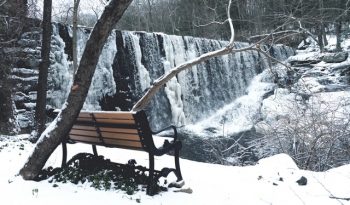French Music – Saint André Posted by Tim Hildreth on Feb 11, 2020 in Culture, Music, Vocabulary
We had Groundhog Day here in the US recently. The Groundhog Day tradition veut (is supposed to mean1This is an idiomatic use of the verb vouloir/to want that implies somebody wants something to be / to be true, even though maybe it really isn’t!) that the arrival of spring will – or will not be – early depending on whether la marmotte (the groundhog) sees its ombre (shadow) or not2There was no shadow this year, which means we should have an early spring.

En attendant le printemps
Regardless of what the groundhog said, we are still in the heart of l’hiver (winter) here in the northeastern United States.
This song, from Saint André who we met at the end of last week’s post, feels ripe for the season and for a world waiting in the cold and the dark, attendant le printemps (waiting for the spring).
Saint André’s native Corse (Corisica) has had a tumultuous history and Saint André dedicated this chanson (song), released in 2014, to the memory of a friend, a Corsican official, assassinated a few weeks before the song’s release.
| La Terre où j’ai grandi | The land where I grew up |
| N’a rien d’un enfer | Is no Hell |
| Ni rien d’un paradis | Neither is it Heaven |
| La Terre où j’ai grandi | The land where I grew up |
| Souffre plus qu’elle ne crie, | Suffers more than she shows |
| Des hommes qu’elle enterre, | From all the men she has buried |
| Des hommes et leur folie | The men and their follies |
| Que les feuilles tombent | Let the leaves fall |
| Rien d’anormal | There is nothing wrong about that |
| Les voir succomber sous le froid glacial | Seeing them give in to the freezing cold |
| Mais l’hécatombe | But the carnage |
| Les grandes rafales | The great gusts |
| N’épargnent plus même un gilet pare-balles | Not even a bullet-proof vest can spare |
| Cusi vénerà di veranu | [Corse3This site, dedicated to the Corse language, came in handy for this translation] Come on spring (or) |
| Cusi vénerà di veranu | [Corse] When will spring arrive? |
| Glacé par le vent qu’emporte l’hiver | Frozen by the winter winds |
| Assis sur un banc j’attends le printemps | Sitting on a bench, I wait for the spring |
| Glacé par le vent qu’emporte l’hiver | Frozen by the winds which the winter brings |
| Assis sur un banc j’attends le printemps | Sitting on a bench, I wait for the spring |
| Je veux croire aux saisons | I want to believe in the seasons |
| Voir le cycle de la vie | To see the cycle of life |
| L’emporter pour de bon | To take it back for good |
| Sur l’île où j’ai grandi | To the island I grew up on |
| Je veux voir les fleurs | I want to see the flowers |
| Recouvrir le goudron | Covering the tar |
| Réchauffer les cœurs | Warming the hearts |
| Et s’il est un rapport de force | And if it comes down to |
| Entre gangsters et population | The gangsters and the people |
| Sache que mes poings de petit corse | Know that my small Corsican fists |
| Seront à jamais plus forts que le plomb | Will always be stronger than lead |
| Cusi vénerà di veranu | [Corse] Come on spring (or) |
| Cusi vénerà di veranu | [Corse] When will spring arrive? |
| Glacé par le vent qu’emporte l’hiver | Frozen by the winter winds |
| Assis sur un banc j’attends le printemps | Sitting on a bench, I wait for the spring |
| Glacé par le vent qu’emporte l’hiver | Frozen by the winds which the winter brings |
| Assis sur un banc, j’attends le printemps | Sitting on a bench, I wait for the spring |
| Assis sur un banc, j’attends le printemps | Sitting on a bench, I wait for the spring |
Ecouter la chanson en corse / Listen to the Corsican version of the song.
- 1This is an idiomatic use of the verb vouloir/to want that implies somebody wants something to be / to be true, even though maybe it really isn’t!
- 2There was no shadow this year, which means we should have an early spring
- 3This site, dedicated to the Corse language, came in handy for this translation

Build vocabulary, practice pronunciation, and more with Transparent Language Online. Available anytime, anywhere, on any device.



